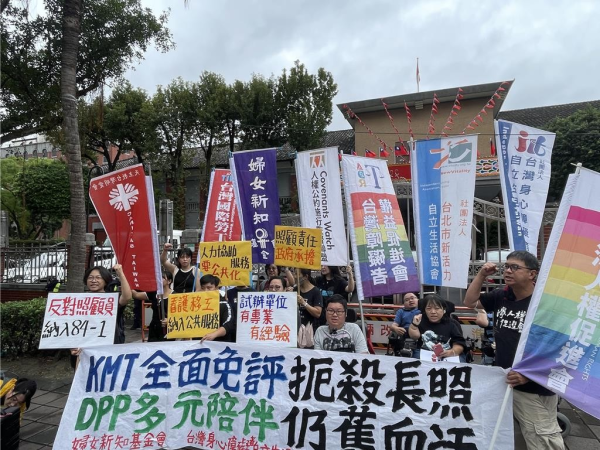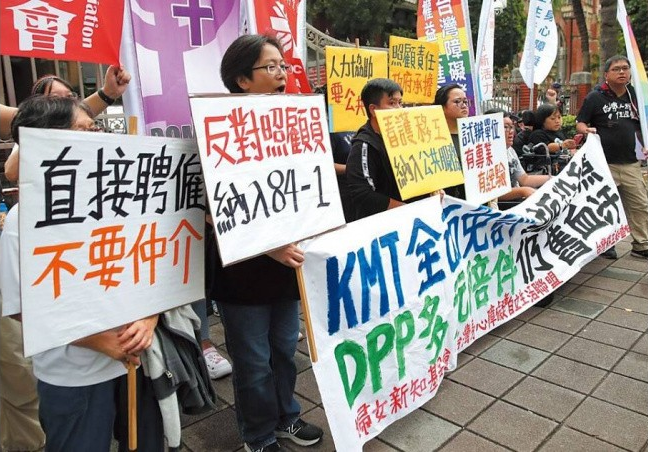
The Ministry of Labor (MOL) recently announced plans to implement a "Diverse Companion Care Pilot Program" where migrant workers employed by intermediaries and NGOs would serve as "diverse companion caregivers" for families in need of temporary caregiving, essentially working as hourly caregivers. The program, which proposes a “responsibility-based” pay structure, has attracted criticism from several civil groups on the final day of its public review period, October 28. These groups voiced concerns that migrant caregivers under the program would work 1.8 times more hours per week than local caregivers while receiving only 1.2 times their wages, which they claim constitutes nationality-based wage discrimination.
Considering that some families have short-term, temporary, or emergency caregiving needs that do not fall under the current long-term care system, the MOL designed this pilot program to allow agencies and nonprofit organizations to act as employers. They would hire and train foreign caregivers to serve as "diverse companion caregivers" for temporary family care, such as part-day or hourly-paid services, or full-day care for accompanying patients to medical appointments, all funded out-of-pocket by the families.

The MOL’s recent draft proposal for the program accounts for the highly intermittent nature of this work, which makes it difficult to assign fixed rest periods. Because it would be challenging to apply standard work-hour regulations, the proposal would allow "diverse companion caregivers" to operate under Article 84-1 of the Labor Standards Act, which includes "responsibility-based" pay. The proposal’s public consultation period is open until October 28.
Today, several civil organizations, including the Awakening Foundation, Taiwan Association for Independent Living of People with Disabilities, and Migrants Empowerment Network in Taiwan, expressed strong discontent over the pilot program at a press conference in front of the Legislative Yuan.
Ong Chian-wen, a representative from the Taiwan International Workers' Association (TIWA), highlighted that domestic caregivers do not fall under "responsibility-based" pay, yet migrant caregivers under this program would, arguing that this discrepancy constitutes clear nationality discrimination. Furthermore, the program would require migrant caregivers to work 1.8 times more than domestic caregivers per week while only earning 1.2 times their wages, seemingly as a low-cost solution to fill caregiving workforce gaps. She expressed strong opposition to the MOL’s inclusion of migrant caregivers in "responsibility-based" work for this program.
Domestic Caretaker Union (DCU) Secretary-General Huang Tzu-hua noted that under the pilot program, families would still need to privately hire migrant caregivers for housework, thus limiting accessible services. Additionally, unequal pay between domestic and migrant caregivers could lead to competition with local caregivers. Huang urged the MOL to collaborate with the Ministry of Health and Welfare (MOHW) to incorporate the "Diverse Companion Care Pilot Program" into the long-term care system, ensuring equal pay for equal work between migrant and domestic caregivers and providing families with government subsidies for caregiving services.
Taiwan Association for Independent Living Secretary-General Lin Chun-chieh added that people with severe disabilities who rely on others for nearly all tasks should not have to bear the out-of-pocket costs of hiring caregivers. Lin urged the MOL to consider the opinions and needs of people with disabilities in the pilot program's development. She recommended that a certain percentage of stakeholders be involved in the decision-making process and that the program be continuously adjusted to prevent past issues, such as communication challenges and caregiver burdens, from reoccurring.
[China Times, Report by Chua Pei-chia] 14:052024/10/28
[Photo by Chua Pei-chia,Huang Shiqi ]
